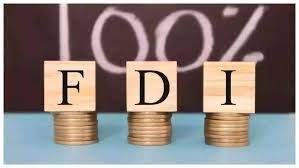Foreign Direct Investment (FDI) Equity Inflows Decline by 34% to $10.94 Billion in April-June 2023
Foreign Direct Investment (FDI) is a crucial aspect of India’s economic growth, and its trends are closely monitored, especially by aspirants preparing for various government exams. In the April-June quarter of 2023, India witnessed a significant decline in FDI equity inflows. In this article, we will delve into the reasons behind this decline, its implications, and what students aspiring for government positions should take away from this development.

Why this News is Important:
Decline in FDI Inflows: The first and foremost reason this news is significant is the decline in FDI equity inflows. During the mentioned quarter, India received $10.94 billion in FDI, which is a 34% decrease from the previous year. This indicates a shift in global investment patterns and has significant economic implications.
Impact on Economy: FDI plays a crucial role in economic growth as it brings in capital, technology, and expertise. A decline in FDI can affect job creation, infrastructure development, and overall economic expansion.
Historical Context:
To understand this decline in FDI, let’s look at some historical context. India has been actively working on improving its ease of doing business rankings and introducing policies like “Make in India” to attract foreign investments. However, global economic uncertainties, changes in geopolitical dynamics, and the ongoing COVID-19 pandemic have made investors cautious. Additionally, changes in taxation policies have also impacted FDI trends.
Key Takeaways from this News:
| Serial Number | Key Takeaway |
|---|---|
| 1 | FDI equity inflows in India declined by 34% to $10.94 billion in April-June 2023. |
| 2 | This decline may impact job creation, infrastructure development, and economic growth in India. |
| 3 | Understanding the reasons behind FDI trends is essential for aspirants preparing for competitive exams. |
| 4 | Global economic uncertainties and changes in taxation policies have contributed to this decline. |
| 5 | Government policies aimed at attracting foreign investments play a crucial role in FDI trends. |
Important FAQs for Students from this News
What is FDI equity inflow, and why is it important for India’s economy?
FDI equity inflow refers to foreign investments made in Indian companies where the investor holds a significant stake, usually 10% or more. It’s important for India’s economy as it brings in capital, technology, and expertise, which can boost economic growth.
What are the main reasons behind the decline in FDI equity inflows in April-June 2023?
The decline can be attributed to global economic uncertainties, changes in taxation policies, and the ongoing COVID-19 pandemic. These factors have made foreign investors cautious.
How does a decline in FDI inflows affect job creation in India?
A decline in FDI can impact job creation negatively as it may lead to reduced investments in industries that create employment opportunities.
What government policies and reforms are in place to attract foreign investments in India?
Policies like “Make in India” and improvements in the ease of doing business rankings have been introduced to attract foreign investments.
Why is it essential for competitive exam aspirants to stay updated on economic trends like FDI inflows?
Competitive exams often include questions related to current affairs and their implications, and economic trends are an integral part of this.
Some Important Current Affairs Links

















